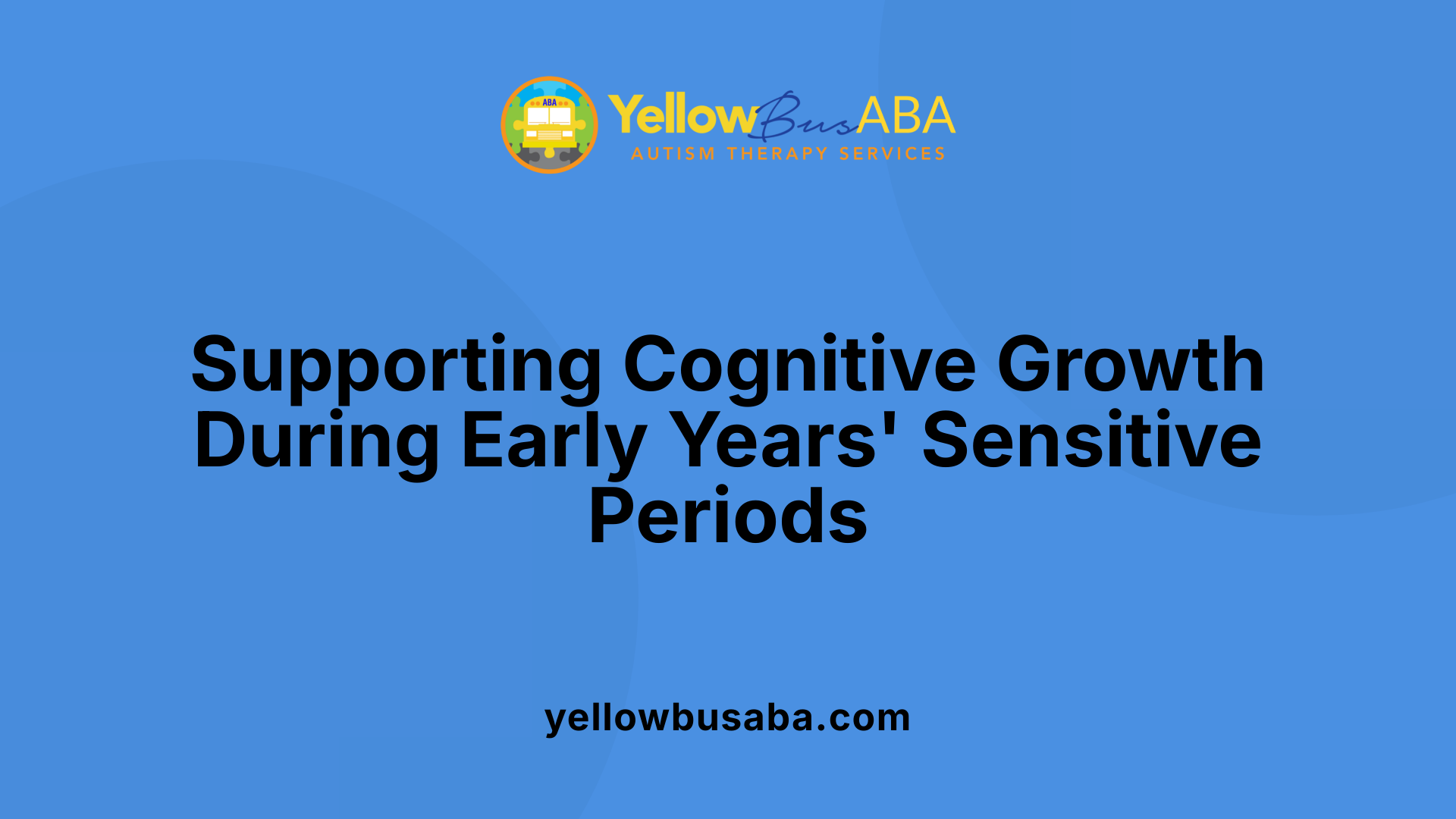Understanding the Critical Role of Early Childhood Intervention
Early childhood intervention (ECI) is a vital system of services designed to support the developmental needs of infants and toddlers, particularly those with or at risk for developmental delays. Recognized legally under the Individuals with Disabilities Education Act (IDEA), Part C, ECI targets children from birth through age three, a period of unparalleled brain plasticity. This early support is essential not only for fostering immediate developmental progress but also for setting the stage for lifelong cognitive, social, and emotional achievements.
The Scope and Purpose of Early Intervention

What is early intervention?
Early intervention (EI) is a comprehensive system of services and supports designed to help infants and young children who have developmental delays or are at risk of developing such delays. These services are available from birth until preschool age, targeting the critical early years when the brain is most adaptable. EI involves assessments, therapies, and family support to foster growth across various developmental areas.
Which developmental domains are targeted?
Early intervention monitors and supports development in five primary areas:
- Cognitive skills
- Social-emotional development
- Physical and motor skills
- Communication abilities
- Self-help and adaptive skills
Interventions in these areas aim to reduce delays, promote individual strengths, and build foundational skills necessary for future learning and independence.
Why is early intervention crucial?
Implementing EI early is vital because the initial years of life are when neural connections are forming rapidly. Early diagnosis of delays allows for prompt intervention, which significantly improves developmental outcomes. For example, targeted therapies can enhance language, motor, and social skills, helping children reach milestones more successfully.
Early interventions also support better school readiness by developing critical language and social-emotional skills. Moreover, they help families feel more confident and engaged through support and coaching, making it easier to incorporate developmental strategies into daily routines.
Prompt intervention can reduce later behavioral challenges and frustrative behaviors by teaching children effective communication and coping skills early on. The benefits extend into later life stages, showing gains in academic achievement, social competence, and even lower rates of future behavioral issues.
Having tutors, therapists, and educators work together with families, EI enables tailored support that counts on the child's individual needs. This early effort creates a positive trajectory, setting children on a path toward better health, educational success, and overall well-being.
The Brain's Plasticity and Critical Developmental Periods

How does early childhood intervention support and improve children's cognitive development?
Early childhood intervention plays a vital role in boosting cognitive development, especially during the brain's most flexible period—the first three years of life. This stage, known as a critical window, features rapid growth of neural connections that form the foundation for all future learning.
During this time, interventions such as play-based activities, language exposure, and problem-solving tasks stimulate key brain areas responsible for thinking, memory, and reasoning. These experiences help create and strengthen neural pathways, promoting language skills, cognitive abilities, and adaptability.
Supportive interventions also focus on teaching families how to foster development through daily routines and interactions. This empowers parents and caregivers to provide stimulating environments, which can enhance the child's learning, social skills, and emotional regulation.
Research shows that well-timed early intervention significantly improves developmental milestones, leading to better academic performance and lifelong skills. It reduces learning difficulties and behavioral challenges, setting children on a positive trajectory for future success.
Neural development during early years
In the first three years, the brain forms approximately 1,000 new neural connections every second. These connections underpin essential skills such as attention, language, and motor coordination.
This developmental phase is highly sensitive; experiences during this period shape the architecture of the brain, influencing future cognitive and emotional health.
Brain plasticity and how intervention maximizes it
Brain plasticity, or neuroplasticity, refers to the brain's ability to reorganize itself by forming new neural connections. Early intervention takes advantage of this natural flexibility by providing targeted stimuli that guide brain development.
For example, therapies like speech or occupational therapy involve engaging activities that encourage neural pathways associated with communication and motor skills.
By targeting these pathways early, interventions help children develop better language, problem-solving, and social skills, enhancing overall cognitive resilience.
Consequences of missed windows for development
If developmental delays or issues are not addressed during this critical period, children risk falling behind their peers in key skills. Missed opportunities for early intervention can lead to increased difficulties with learning, social integration, and emotional health.
Furthermore, delays in cognitive development during this window may result in longer-term challenges, such as lower academic achievement and difficulty building social relationships.
In sum, early intervention during the brain's most malleable period profoundly affects a child’s developmental trajectory, making timely support essential for optimal growth and lifelong success.
Strategies and Methods in Early Childhood Intervention
What strategies and methods are used in early childhood intervention to promote cognitive development?
Early childhood intervention employs a range of engaging and therapeutic strategies to enhance a child's cognitive growth. Play-based learning is at the core of these methods, utilizing activities like imaginative play, storytelling, and reading aloud to stimulate thinking, problem-solving, and language skills. These interactive experiences encourage children to explore and understand their environment, laying the groundwork for academic success.
In addition to play, various therapies support neural connection development crucial for communication, movement, and daily functioning. Speech therapy helps children develop language and literacy abilities, while occupational and physical therapies improve motor skills and coordination. These therapeutic approaches are tailored individually, facilitating targeted development and preventing or reducing delays.
Assessment plays a vital role in early intervention by identifying developmental delays or disabilities early on. This enables professionals to design personalized support plans that address specific needs, ensuring children catch up in cognitive, social-emotional, and adaptive skills.
Family involvement is essential. Early educators and therapists work collaboratively with families through coaching and guidance, helping parents support their child's learning at home. This partnership ensures consistency and maximizes the impact of interventions.
In sum, early intervention focuses on creating stimulating, supportive environments where children can develop critical thinking, problem-solving, and language skills. These efforts during the brain's most flexible years significantly influence future academic achievement and social success.
Empirical Evidence Supporting Early Intervention
What is the impact of early intervention on a child's cognitive development according to scientific evidence?
Research shows that early intervention has a strong impact on a child's cognitive development. During the first three years of life, the brain is highly adaptable, and neural circuits are forming connections that support learning, behavior, and health. By providing targeted therapies and educational activities early on, children can develop essential skills such as attention, memory, cause-and-effect understanding, symbolic thinking, and early math concepts.
Studies indicate that children who receive early intervention can experience significant improvements in IQ scores and functional capabilities like self-regulation and problem-solving. For example, a national study found about one-third of infants and toddlers who participated in early intervention no longer had disabilities by kindergarten. These improvements set a foundation for higher academic achievement and better lifelong outcomes.
Furthermore, programs that emphasize parent-child interactions and cognitively stimulating environments tend to boost cognitive growth more effectively. The early benefits often include enhanced executive functioning and problem-solving skills, which are critical for school readiness.
While some IQ gains may fade during middle childhood, children still tend to show sustained benefits in school performance, lower rates of grade retention, and fewer referrals for special education. The evidence strongly supports that earlier, individualized, and intensive early intervention increases the likelihood of reaching a child's full potential.
This body of research underscores the importance of prompt, tailored early interventions to support cognitive advancement and provide children with the skills they need for future success.
The Role of Early Diagnosis and Family-Centered Services
How does early diagnosis and specialized services contribute to supporting children's cognitive progress?
Early diagnosis plays a critical role in identifying developmental delays or disabilities at the earliest possible stage. When combined with specialized early intervention services, it allows professionals to design targeted therapies that directly support a child's cognitive development.
These interventions are most effective during the first three years of life when neural circuits responsible for thinking, learning, and problem-solving are at their most flexible. By harnessing this brain plasticity, early diagnosis and tailored therapies help establish strong neural connections, boosting skills like attention, memory, reasonings, and early math concepts.
Furthermore, specialized services include a variety of therapies such as speech therapy, occupational therapy, and physical therapy, which support key cognitive tasks. These therapies not only improve specific skills but also foster overall school readiness, social-emotional growth, and communication abilities.
Family involvement is an essential component. Coaching and supporting families enable them to recognize learning opportunities and incorporate developmental strategies into daily routines. This collaborative approach ensures that interventions are consistent and sustainable, promoting steady cognitive progress.
Research shows that children who receive early, specialized support are less likely to require intensive special education later and have lower rates of social and behavioral issues. The earlier challenges are addressed, the better the child's long-term health, educational, and social outcomes.
In sum, early diagnosis combined with family-centered, targeted services significantly boosts cognitive development. It paves the way for children to reach their full potential, forming a strong foundation for ongoing learning and success.
Long-Term Benefits and Lifelong Learning Outcomes

How does early childhood intervention contribute to long-term cognitive skills and learning abilities?
Early childhood intervention (ECI) significantly impacts a child's future cognitive skills and learning capacity by focusing on the critical first years of development when the brain forms essential neural connections. These programs include therapies such as speech, occupational, and physical therapy, as well as play-based learning activities, which stimulate the developing brain and foster neural plasticity.
By supporting cognitive, language, motor, and emotional growth during this window of opportunity, ECI helps children build a solid foundation for later academic achievement. When developmental delays are identified early, interventions can be tailored to enhance learning abilities, leading to better performance in school, higher IQ scores, and improved problem-solving skills.
Furthermore, early intervention promotes social and emotional skills like cooperation, empathy, and emotional regulation. These abilities are crucial for healthy peer relationships and successful social interactions throughout life.
Children who receive high-quality, individualized early support tend to develop greater self-confidence and independence. This independence translates into resilience and adaptability—vital qualities for navigating the challenges of school, work, and personal life.
In summary, early intervention not only leads to immediate improvements in developmental milestones but also offers enduring advantages. These include higher educational achievement, better social adjustment, and increased likelihood of lifelong success, making it a vital investment in a child's future.
Fostering a Brighter Future Through Early Support
Early childhood intervention is a cornerstone of nurturing cognitive development and ensuring children are equipped with the skills necessary for lifelong success. By harnessing the brain's innate plasticity during the earliest years, targeted services—ranging from therapies to family coaching—can significantly enhance a child's development across multiple domains. The benefits extend beyond immediate gains, fostering academic achievement, social-emotional resilience, and independence well into adulthood. Recognizing the importance of early diagnosis and personalized approaches, communities and policymakers are encouraged to invest in accessible, evidence-based early intervention programs. Such investments not only transform individual lives but also contribute to healthier, more capable societies for future generations.
References
- Early Intervention (EI): Helping children to develop to their full potential
- Why Early Intervention? A Great Opportunity for Children and Families
- Promoting Healthy Development Through Intervention - NCBI
- Understanding the Role of Early Childhood Intervention - Brightwheel
- How Specialized Skills Training Supports Cognitive Development
- [PDF] What is Early Intervention and Why is it Important | USU IDRPP
- Overview of Early Intervention
- Early Intervention Impact on Child Development Explained






